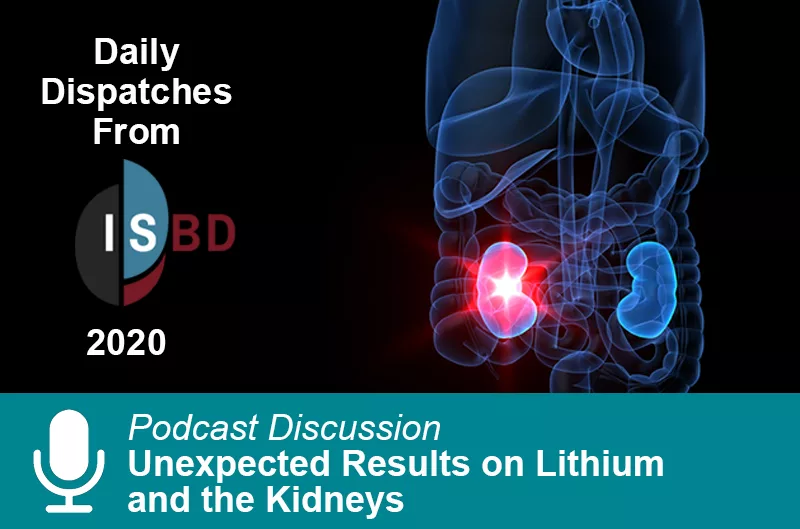This week we’re podcasting from the International Society for Bipolar Disorders 2020 conference, where we’ve been scouring the virtual halls for all that is practical and newsworthy. The yield is high so tune in for a new episode every day. Today, a poster presentation from the Mayo Clinic challenges conventional wisdom about whether to stop lithium in the face of renal decline.
Published On: 7/3/2020
Duration: 5 minutes, 42 seconds
Transcript:
This week we’re podcasting from the International Society for Bipolar Disorders 2020 conference, where we’ve been scouring the virtual halls for all that is practical and newsworthy. The yield is high so tune in for a new episode every day. Today, a poster presentation from the Mayo Clinic challenges conventional wisdom about whether to stop lithium in the face of renal decline.
Welcome to the Carlat Psychiatry Podcast, keeping psychiatry honest since 2003. I’m Chris Aiken, the editor in chief of the Carlat Report. And I’m Kellie Newsome, a psychiatric NP and a dedicated reader of every issue.
Sometimes it’s the uncontrolled trials that change practice, particularly when their results go against the grain. That’s what happened in 2017 when Lars Kessing and colleagues published their seminal paper on lithium in renal disease. They looked at 754 patients with chronic kidney disease who were taking lithium or an anticonvulsant. Some were continued on the medication, while others stopped it. You’d expect the renal function to improve when lithium was stopped, but they found the opposite: Patients who stopped mood stabilizer ─ whether lithium or anticonvulsant ─ had worse renal outcomes than those who continued it.
But wait – you do kind of expect that. I mean it’s likely that the doctors stopped these meds in patients who were sicker, and they continued to get sicker. They tried to control for that selection bias, and the finding still held up. But there was one more finding that starts to raise questions. Dr. Kessing honed in on the patients with bipolar disorder, and found their renal function fared better when continued on lithium vs. switching to an anticonvulsant.
How do you explain that? Perhaps – it’s all about the tubules. At least one anticonvulsant ─ valproate/depakote ─ is associated with renal damage in the proximal tubules. Lithium, in contrast, causes damage in the distal tubules. So switching to valproate could just damage the healthier half of the kidneys.
Dr. Kessler’s study gives some reassurance for continuing lithium even as the creatinine starts to rise, but it needed replication. And that’s what we got in a poster presentation by Dr. Mehak Pahwa and colleagues from the Mayo Clinic. The data was once again observational, and they arrived at the same conclusion: the risk of progressing to end stage renal disease was the same in patients with chronic kidney disease who continued vs. stopped lithium. Sadly, that rate was high, about 50% in both groups.
And end stage renal disease is a sad disease. The risk of suicide is 7-times higher in this population, and it’s highest in the first year of dialysis. We need to take that into consideration when stopping lithium. Lithium prevents 1 in 8 suicides in bipolar disorder, and the risk of suicide goes up 20-fold in the first few months after lithium is stopped; 20 fold if it is stopped abruptly. It’s best to stop lithium slowly, over 1-2 months to prevent drastic worsening of mood. Lithium’s effects on the kidneys are also dose-dependent, with some studies showing no renal effects if the level is kept below 0.8.
Join us tomorrow for a special edition word-of-the-day: Ultradian Cycling in Bipolar.
Do you like having your Carlat Podcast Daily? Let us know by leaving a review in your podcast store, and we’ll try to keep up the pace.
We’ll have more updates in our print issue, including unpublished results on a new medication for bipolar depression and a full review of the modafinils in bipolar disorder.
Got feedback? Take the podcast survey.


_-The-Breakthrough-Antipsychotic-That-Could-Change-Everything.webp?t=1729528747)



